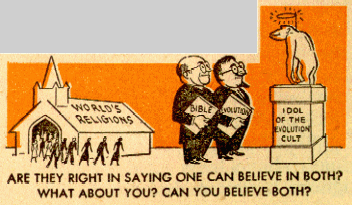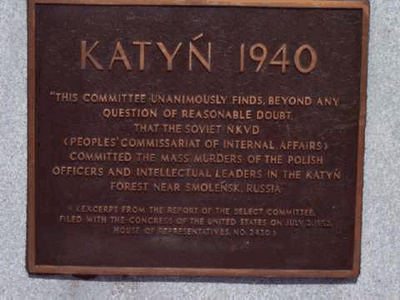incompatibility - their side

Of course it's not only Dennett and other philosophers, and scientists, who find evolution and the Christian god incompatible - many Christians do too, bless their souls. I'll present a more or less typical example from 'the Christian Courier', with my commentary.
This 'guide to youth' online mag presents the incompatibilities in forceful dot-points:
- The Bible teaches that matter is not eternal; rather, it was created by God (Genesis 1:1; Hebrews 11:3). Evolution, on the other hand, asserts that matter is eternal, and that it is absurd to suggest that it was created ex nihilo (out of nothing).
2. The Genesis account affirms that the Earth was created on the first day of that initial week (Genesis 1:1), and that the Sun and stars were created later – on the fourth day (Genesis 1:14-19). Evolution asserts that the Sun and stars existed billions of years before our Earth came into being.
This is the same point, but provides even clearer evidence that the author is anti-science rather than simply anti-evolution. It's notable than neither here nor in any of the other 20 points is the 'evidence' word used, while the words 'assert' and 'affirm' are used in typically bent ways. I won't comment in detail on all 20 points though, that would be too boring.
Points 3, 4 and 5 each deal again with what the Bible 'states' or 'teaches' and what evolution 'contends', but again, none of them have anything to do with evolution. They're about the geology of the earth and the origin of our solar system. What the points don't state of course, is that our understanding of the great age of the earth, through the work of Charles Lyell and others in the eighteenth and early nineteenth centuries, helped us to make sense of the evidence of fossils and to speculate more effectively on the origins of life.
Points 5 onward mostly deal with biology at least, and compare what the Bible 'states' and 'reveals' [revealing word] with what current science 'contends' etc. They at least have the virtue of displaying what is obviously a real incompatibility. The last two points, though, reveal the defensiveness and desperation of the author's position:
- The Bible announces that God made man in His own image (Genesis 1:26; 1 Corinthians 11:7). Evolution scoffs at such, and suggests that man, because of his fears of natural forces that he could not understand, created God in his own image.
- Each of the Bible spokesmen treated the Genesis record of origins as literal history – i.e., a true account of what actually happened in the beginning (cf. Matthew 19:4ff; Romans 5:12ff; 1 Corinthians 11:7-8; 15:45ff; 2 Corinthians 11:3; 1 Timothy 2:13). Evolution laughs at the inspired documents, repudiating them as literal history.
Evolution is laughing at us! It's not fair. It hardly needs pointing out that it isn't just evolutionists who largely repudiate the literal truth of the events portrayed in the Bible. Historians and archaeologists are mostly agreed that the Bible is as inaccurate and unreliable as are all the documents of the era as a guide to the truth of historical events. But this idea of 'the disciples of Darwin' [the author's phrase] mocking the true faith is of course itself very Biblical. Evolution, throughout, is presented in the third person singular, as a false god worshipper, or a devil worshipper, or perhaps as the devil himself. Such entrapment in an outmoded and profoundly limited way of thinking almost elicits sympathy.
I'm not serious of course. The author's final remarks further underline the unprincipled nature of his 'argument':
Our young people need to be told forthrightly that the Bible and evolution do not agree. The theory of evolution is not only anti-biblical, but also is contrary to sound scientific principles in many areas. It should be resolutely rejected.As he has amply demonstrated, the author is opposed to all science rather than simply evolution, yet he's not above invoking 'sound scientific principles' to reject science. It's deceitful in the extreme of course, but I'm prepared to exonerate him on the grounds of profound stupidity. The revolting thing is that space-wasters like this character consider themselves guides to youth. Of course, youth is too bright to be attracted to such dimness [I hope]. Even more revolting is that there are thousands of websites like this out there.





